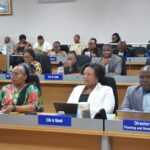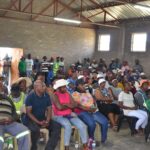AN IMPROVED QUALITY OF LIFE FOR ALL RESIDENTS
The District Disaster Management Unit has been established to develop the District’s capacity to deal with disasters. The roles and responsibilities of the centre is to coordinate, plan, build capacity and to prevent and mitigate potential disasters that the area is prone to such as tornados, floods, thunder storms, snow, swine fever, cholera and diarrhoea. In addition, local offices have been established by the District to perform the function at local municipal level.
The disaster management centre has been established with a District Disaster Management, Fire and Rescue Services Unit and four satellite offices in in Mount Fletcher, Burgersdorp, Aliwal North and Lady Grey. A well-equipped District disaster centre is in the process of being established in Barkly East and Aliwal North
FIRE FIGHTING
Firefighting is a shared service between the District and the local municipalities but currently only the District is budgeting for this service. The District is operating a full-time fire services.
MUNICIPAL HEALTH SERVICES
The District is responsible for the provision of Municipal Health Services (MHS). These services extend to include water quality control, food control, waste management control, surveillance and prevention of communicable diseases, vector control, environmental pollution control, and burial of the dead control. There is functional integration with provincially employed Environmental Health Practitioners.
This service directly impacts on many businesses of the District area by developing systems and protocols for the inspection of premises, reporting of incidents and certification of premises to perform various functions.
In order to improve the provision of the service the district has developed by-laws which are presented to Council for adoption.
ROAD MAINTENANCE
The District is currently implementing the roads maintenance function in Gariep and Maletswai municipalities on behalf of the Department of Roads and Transport. The District formalised the appointment of casual workers who have been working in the roads section.
Overall, these massive infrastructure projects will assist in alleviation of the service delivery backlog and provide jobs opportunities in line with the strategic goal of alleviating poverty and stimulating economic development within the region.
STORM WATER
Storm water drainage forms part of the maintenance of roads and as such is included in the budgets of the local municipalities for roads.
SANITATION
The District has 14 Waste Water Treatment Works (WWTW’s). A large proportion of the District’s budget is dedicated for the puropose of dealing with the sanitation services backlog. Significant investments have been made in the area of bulk water infrastructure development to enable provision of waterborne sanitation systems in some areas.
WATER
The majority of water within the District is utilised by domestic consumers. Sectors such as agriculture rely on borehole water supply systems.
In accordance with its by-laws, the District is providing three levels of services : Basic, Intermediate and Full Service levels.
- Basic level of service refers to where the community is accessing water through communal standpipes situated at a maximum distance of 200 meters from the furthest homestead.
- Intermediate level of service consists of yard connections.
- Full level of service refers to house connections
The District took over the function of water service provision from its four Local Municipalities. Billing of water is done by the District.
Water quality
The District has a continuous programme of daily operational monitoring of drinking water quality and results are shared with the Department of Water on a monthly basis. All water treatment works are fitted with water quality tesing equipment. Effluent samples are taken monthly to assess the level of compliance with standards.
Free basic services
Indigent households are provided with six thousand litres (6kl)of free water per month. For more information on free basic services, contact the Joe Gqabi District Municipality (045) 979 3048.
Water conservation and demand management interventions
The Water Services Development Plan (WSDP) contains water conservation and water demand management strategies. Implementation of these strategies seeks to reduce water wastage and inefficient use as well as introduce measures to effectively manage and sustain service efficiency targets.
Some of the priority requirements include installation of systems that measure and identify key parameters such as minimum night flows and systems that enable detailed and regular water audits and water balances.
The Water Conservation and Demand Management Strategy addresses the following main water conservation issues:
- Water Loss Control programme
- Asset Operations and Maintenance programme
- Catchment erosion prevention and mitigation programme
- Management and rehabilitation of wetlands programme
- Alien vegetation removal programme
- Accounting and Cost Recovery systems improvement programme
- Capacity building programme
- Public Information and consumer education programme
- Development of bylaws that will support the sustainable management of all wateand sewage related resources
- Institutional arrangement establishment
Please report all water services incidents and billing enquiries to the District Customer Care Toll Free Number : 0800 201 726





